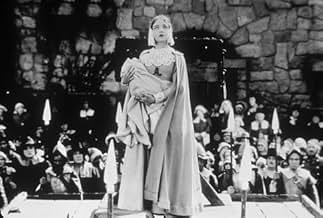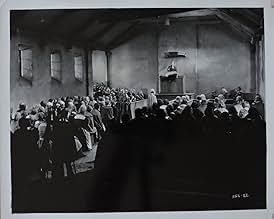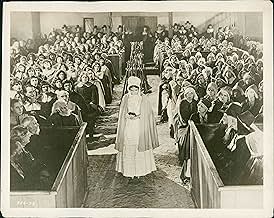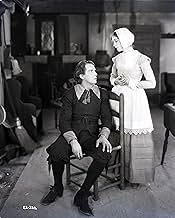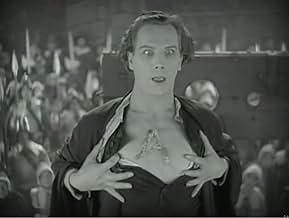VALUTAZIONE IMDb
7,6/10
2085
LA TUA VALUTAZIONE
Aggiungi una trama nella tua linguaAfter having a baby out of wedlock, a young Puritan woman is pressured to reveal the name of her lover.After having a baby out of wedlock, a young Puritan woman is pressured to reveal the name of her lover.After having a baby out of wedlock, a young Puritan woman is pressured to reveal the name of her lover.
- Regia
- Sceneggiatura
- Star
- Premi
- 1 vittoria in totale
Buck Black
- Child in crowd
- (non citato nei titoli originali)
Nora Cecil
- Townswoman
- (non citato nei titoli originali)
Iron Eyes Cody
- Young Indian at Dunking
- (non citato nei titoli originali)
Artye Folz
- Child
- (non citato nei titoli originali)
Dorothy Gray
- Child
- (non citato nei titoli originali)
Douglas Haig
- Minor Role
- (non citato nei titoli originali)
Betsy Ann Hisle
- Child
- (non citato nei titoli originali)
Recensioni in evidenza
Victor Sjöström's The Scarlet Letter is a masterpiece. It should be put on DVD for all to enjoy, even if parts of the film have to be supplemented with 16mm dupes. TCM hasn't shown it in years, yet they show The Wind several times every year. It makes no sense. The Scarlet Letter is even better than The Wind. It should be shown in high school classes along with the required reading of the classic novel by Nathanial Hawthorne. It makes my head spin to think of how many thousands of children would fall in love with silent film if they were only exposed to this classic. I hate to think of them being exposed to that horrific Demi Moore version instead.
Lillian Gish is radiantly beautiful as the demure but sensual Hester Prynne. Lars Hanson makes an exceptionally wonderful minister Dimmesdale, fighting his romantic feelings for the lovely Hester. Henry B. Walthall makes a very believable and threatening Roger Prynne. Karl Dane adds some wonderful comic relief as Master Giles. The M-G-M production values here are exceptional and the cinematography by Henrik Sartov glows. I love the tracking shots of Hester and the Reverend Arthur Dimmesdale walking together in the woods, and the lovely shot of their reflections in the lake as they confess their love for one another. Poetry on screen. The musical score for the film is quite beautiful, commissioned by TCM in 2000. The only parts that got on my nerves were the harpsichord sections. The flute, piano and violin parts were the best.
Your silent film viewing is not complete without seeing this classic. It's Lillian Gish's best film. Don't miss it.
Lillian Gish is radiantly beautiful as the demure but sensual Hester Prynne. Lars Hanson makes an exceptionally wonderful minister Dimmesdale, fighting his romantic feelings for the lovely Hester. Henry B. Walthall makes a very believable and threatening Roger Prynne. Karl Dane adds some wonderful comic relief as Master Giles. The M-G-M production values here are exceptional and the cinematography by Henrik Sartov glows. I love the tracking shots of Hester and the Reverend Arthur Dimmesdale walking together in the woods, and the lovely shot of their reflections in the lake as they confess their love for one another. Poetry on screen. The musical score for the film is quite beautiful, commissioned by TCM in 2000. The only parts that got on my nerves were the harpsichord sections. The flute, piano and violin parts were the best.
Your silent film viewing is not complete without seeing this classic. It's Lillian Gish's best film. Don't miss it.
After years of desperately wanting to see this movie I finally got hold of a copy of it. I put the DVD in the machine and waited with baited breath, was the film going to be as wonderful as the other commenters(?)had rated it? was it going to be anywhere near as good as the other Gish/Hanson/Seastrom collaboration "The Wind"? Well, the answer was that it was everything I hoped for and more. The version I saw a recording of TCM's restoration so the quality of the print veered from superb to not quite so good, but, in all honesty that did not matter as I soon got caught up in the story of Hester Prynne and the Rev. Dimmesdale. The acting was superb by all the cast, the direction was excellent and the whole setting of the movie was outstanding. It still amazes me who there are those who will not watch a silent movie, are you crazy? This version is a million miles better than the Demi Moore/Gary Oldman version made 70 years later, the chemistry between Gish and Hanson is perfect, the child actress Joyce Coad who plays Pearl, the love child, is delightful and Henry Walthall is menacing as Roger Chillingworth, Karl Dane also deserves mentioning as Master Giles in a slightly comedic role. The only downside to the movie and it had nothing to do with the movie itself was that I bought it from a guy who contacted me via IMDb and led me to believe it was his own print, I paid $52 for a TV recording off TCM. He is contacting people concerning vintage movies so beware if someone offers to get a print of that vintage movie you want to see.
MGM's 1926 adaption of Nathaniel Hawthorne's "The Scarlet Letter" is, quite possibly, the best motion picture to have been released in the silent screen era's latter days. It can, undoubtedly, be looked upon as the best that two of that era's best actors-Lillian Gish & Lars Hanson-were paired up in. And, too, one very talented child actress, by the name of Joyce Coads, deserves to be given big credit. (She made only 10 more films before taking a final bow from the limelight; in her 2nd to last-"Devotion" 1931-she didn't get billing.) "The Scarlet Letter" should also be noted as, perhaps, the very best that Victor Seastrom- whom Charlie Chaplain had called "the best director in all the world" ever delivered. Just don't make the mistake of seeing this film as a good adaption of Hawthorne's novel. Because it's not. The film is a total of an hour and 20 minutes. Had it been really true to the novel, it just might have been longer than "Gone With The Wind." (And, speaking of the wind, as fate would have it, Seastrom directed only one more film in the US, which also teamed up Gish and Hanson: namely, "The Wind" (1928). MGM gave Seastrom his walking papers because he'd refused to give "The Wind" a happy ending. "The Scarlet Letter" of 1926 should also be seen by anyone who just might be under the mistaken impression that silent films can't leave a lasting impression.
There just aren't enough words to describe the beautiful performances in this film....not that words are needed, then or now. Victor Seastrom's lovingly crafted scenes provide perfect visual frames for the transcendent performances of Lillian Gish and Lars Hanson. An artistic triumph for everyone concerned, and a bittersweet reminder of what was lost with the death of the art of the silent film. (The Turner restoration is alas, also bittersweet, as prints of wildly differing quality had to be "married" in order to create a substantially complete copy of the subject. Thus, viewers move from scenes that shimmer with pristine beauty to muddy, contrasty dupes. It's a tribute to the art of all concerned however, that this is not the distracting issue it might be with a lesser film. Like any work of art, you won't notice the cracks and flaws after a while if you're paying attention as you should. It's just a shame that the entire film isn't as mint-fresh as some of its scenes.)
It was a novel Hollywood didn't want to touch in the mid-1920s, even though the 1850 classic was brought to the screen six times earlier. The recently-established Will Hays office had its censorship fangs out. A story about a married woman who gets pregnant by a lover was cause for alarm for most movie studios.
Lilian Gish, one of silent film's major star, had long wanted to bring Nathaniel Hawthorne's 'The Scarlet Letter' in an updated version to the screen. Contracted to MGM in a three-picture deal, she convinced the studio's head of production, Irving Thalberg, she could deliver a tasteful version of Hawthorne's book without moralistic tongue-waggers complaining. With a script by Frances Marion, which follows the novel closely, MGM's August 1926's "The Scarlet Letter" has been praised as the best version of the book in a long-line of past and future movie adaptations.
Its success can be attributed to Gish herself, who portrays Hester Prynne. She hasn't heard from her husband who traveled overseas for several years from their Puritan Boston, Massachusetts, home in the mid-1600s. She becomes pregnant from a man whom she doesn't disclose the name. The Gish version departs from Hawthorne in a couple of major ways: the film begins a year earlier than the author's, showing her condemned to a stockade for leaping and dancing after her song bird escapes its cage. It's there where she meets the Reverend Arthur Dimmesdale (Lars Hanson). Also, the films unveils the love relationship between the minister and Hester, not keeping secret of who's the father of the baby.
Another reason for the movie's overall financial popularity is Swedish director Victor Sjostrom's unique directing. He allowed Gish the freedom to display her attractiveness by literally letting her hair down in a clandestine meeting with Dimmesdale in the woods, reflecting Hester's modernistic independence. Gish had the choice in selecting the director, and she picked Sjostrom because she "felt the Swedes were closer to the feelings of New England Puritans than modern Americans." She also favored Hanson as Dimmesdale from his 1924 performance in "The Saga of Gosta Berling." Hanson, who knew very little English, elected to speak his lines (it was a silent movie after all) in Swedish while Gish spoke English in scenes where they're together. Homesick actress Greta Garbo, recently arriving in America from Sweden after signing a contract with MGM, was a near daily presence on the set since she was comfortable speaking her native language with Hanson.
With two weeks of filming to go, Lillian found out her mother suffered a stroke in London and reportedly dying. Dorothy, her sister, urged her to catch the first boat to England to attend to her. In a near impossible request, Lillian asked Sjostrom she needed to leave in three days to travel by train to New York City, then on to a liner to London. The director didn't flitch. He designed an almost around-the-clock schedule to film all of Gish's parts-as long as the crew agreed to the grueling sleepless itinerary. The workers heartedly agreed.
"The Scarlet Letter" is still admired for Sjostrom's creation of an environmental rise en scene that underscored the film's characters' emotion and psychology by its pastoral recreation of a 17th century village. Even though the residents of Salem, MA, where the story takes place, were insulted by their forefathers' portrayal in the film, the American Film Institute nominated it as one of the most passionate motion pictures ever made as well as nominated Hester Prynne as one of movie's most admired heroes.
Lilian Gish, one of silent film's major star, had long wanted to bring Nathaniel Hawthorne's 'The Scarlet Letter' in an updated version to the screen. Contracted to MGM in a three-picture deal, she convinced the studio's head of production, Irving Thalberg, she could deliver a tasteful version of Hawthorne's book without moralistic tongue-waggers complaining. With a script by Frances Marion, which follows the novel closely, MGM's August 1926's "The Scarlet Letter" has been praised as the best version of the book in a long-line of past and future movie adaptations.
Its success can be attributed to Gish herself, who portrays Hester Prynne. She hasn't heard from her husband who traveled overseas for several years from their Puritan Boston, Massachusetts, home in the mid-1600s. She becomes pregnant from a man whom she doesn't disclose the name. The Gish version departs from Hawthorne in a couple of major ways: the film begins a year earlier than the author's, showing her condemned to a stockade for leaping and dancing after her song bird escapes its cage. It's there where she meets the Reverend Arthur Dimmesdale (Lars Hanson). Also, the films unveils the love relationship between the minister and Hester, not keeping secret of who's the father of the baby.
Another reason for the movie's overall financial popularity is Swedish director Victor Sjostrom's unique directing. He allowed Gish the freedom to display her attractiveness by literally letting her hair down in a clandestine meeting with Dimmesdale in the woods, reflecting Hester's modernistic independence. Gish had the choice in selecting the director, and she picked Sjostrom because she "felt the Swedes were closer to the feelings of New England Puritans than modern Americans." She also favored Hanson as Dimmesdale from his 1924 performance in "The Saga of Gosta Berling." Hanson, who knew very little English, elected to speak his lines (it was a silent movie after all) in Swedish while Gish spoke English in scenes where they're together. Homesick actress Greta Garbo, recently arriving in America from Sweden after signing a contract with MGM, was a near daily presence on the set since she was comfortable speaking her native language with Hanson.
With two weeks of filming to go, Lillian found out her mother suffered a stroke in London and reportedly dying. Dorothy, her sister, urged her to catch the first boat to England to attend to her. In a near impossible request, Lillian asked Sjostrom she needed to leave in three days to travel by train to New York City, then on to a liner to London. The director didn't flitch. He designed an almost around-the-clock schedule to film all of Gish's parts-as long as the crew agreed to the grueling sleepless itinerary. The workers heartedly agreed.
"The Scarlet Letter" is still admired for Sjostrom's creation of an environmental rise en scene that underscored the film's characters' emotion and psychology by its pastoral recreation of a 17th century village. Even though the residents of Salem, MA, where the story takes place, were insulted by their forefathers' portrayal in the film, the American Film Institute nominated it as one of the most passionate motion pictures ever made as well as nominated Hester Prynne as one of movie's most admired heroes.
Lo sapevi?
- QuizLillian Gish learned that her mother had had a stroke in London and her sister, Dorothy Gish, urged her to get there on the first available boat. When Lillian informed director Victor Sjöström of the need to finish the film quickly, he created a shooting schedule that crammed two weeks worth of shooting into three days of non-stop work. The crew worked without complaint so that she could finish the film early and catch the earliest possible train to New York.
- Citazioni
Mistress Hibbins: I am wrongly accused! Never hath my tongue been given to gossip!
The Governor: Falsehood! Her tongue hath wagged like the tail of a dog! Duck her again!
- Versioni alternativeIn 2000, Turner Entertainment Co. copyrighted a restored version with a musical score written by Lisa Catarineau and Mark Northam and a running time of 98 minutes. Its previous version ran 79 minutes.
- ConnessioniFeatured in The 43rd Annual Academy Awards (1971)
I più visti
Accedi per valutare e creare un elenco di titoli salvati per ottenere consigli personalizzati
- How long is The Scarlet Letter?Powered by Alexa
Dettagli
- Data di uscita
- Paese di origine
- Sito ufficiale
- Lingua
- Celebre anche come
- The Scarlet Letter
- Luoghi delle riprese
- Azienda produttrice
- Vedi altri crediti dell’azienda su IMDbPro
Botteghino
- Budget
- 430.290 USD (previsto)
- Tempo di esecuzione1 ora 55 minuti
- Mix di suoni
- Proporzioni
- 1.33 : 1
Contribuisci a questa pagina
Suggerisci una modifica o aggiungi i contenuti mancanti

Divario superiore
By what name was La lettera rossa (1926) officially released in India in English?
Rispondi
